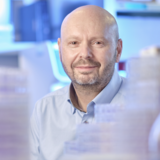
Daniel Peeper
Netherlands Cancer Institute (NKI)
Amsterdam, The Netherlands
visit website
Prof. Dr. Daniel Peeper is professor in Functional Oncogenomics at VU University Amsterdam and a group leader at the Department of Molecular Oncology and Immunology at the Netherlands Cancer Institute (NKI).
He and his research team use function-based genomic approaches to overcome immunotherapy resistance in cancer. Their research increased the understanding of signaling mechanisms between tumor and immune cells, allowing insight into more specific targetable cancer vulnerabilities. They discovered the tumor-suppressing mechanism of oncogene-induced cellular senescence leading to an inflammatory transcriptome, and the sensitization of tumor cells towards T cell attack by lowering the TNF threshold. Their establishment of a large melanoma patient-derived xenograft (PDX) platform allowed insight into several novel resistance mechanisms. Based on the findings of Peeper’s research group, several potential new tumor and immune cell targets have been detected and are currently being tested in preclinical models.
He is member of several boards including the European Association for Cancer Research, Oncode, EMBO, Academia Europeae and he chairs the Research Faculty Council Board at the NKI. He has received several awards including the KWF Queen Wilhelmina Award and the Society for Melanoma Research Outstanding Researcher Award.

Simon Duchesne
Quebec City Mental Health Institute
Quebec, Canada
visit website
Dr. Duchesne holds a professorship at the Department of radiology at Université Laval as well as numerous leadership roles like at the Québec City Mental Health Institute, Canadian Consortium for Neurodegeneration and Aging and at Cervo Brain Research Centre.
Prof. Dr. Simon Duchesne is a biomedical engineer by training, yet his scientific path led him to investigate the earliest possible diagnosis of degeneration of the brain, as caused by disorders such as Alzheimer's disease. By comparing measurements taken from radiological images of the brains of cognitively healthy people with those of the brains of people with a disease, Professor Duchesne and his team determine the significant differences that characterize the latter. The presence of such biomarkers in the brain could predict the onset of symptoms decades in advance.

Nicole Avena
Icahn School of Medicine at Mount Sinai
New York, USA
visite website
Dr. Nicole Avena is an Associate Professor of Neuroscience at Icahn School of Medicine at Mount Sinai and a Visiting Professor in Health Psychology at Princeton University.
Her research interest is focused on nutrition, diet, food addiction and obesity. Moreover, she is also an expert on pregnancy and childhood nutrition. In particular, her lab is using translational models for disordered eating behaviors and drug use in order to better understand behavioral and brain systems that regulate motivated behaviors.
She has received a PhD in Neuroscience and Psychology from Princeton University and then moved on to work at the Rockefeller University in New York City to complete a postdoctoral fellowship. Her research has received several awards including from the New York Academy of Sciences, the American Psychological Association and the National Institute of Drug Abuse.
Dr. Avena is also the author of several books and a well-known speaker. She has a passion for communicating and explaining complex research and scientific discoveries to a broad audience and has held a well-known TED talk.

Johannes Huppa
Medical University of Vienna
Vienna, Austria
visit website
Dr. Johannes Huppa studied Biochemistry at the Freie Universität Berlin, Germany, and went on to join the Massachusetts Institute of Technology (MIT), USA, in 1994 to conduct his PhD work in the field of adaptive immunity. He received his postdoctoral training at the Harvard Medical School (HMS), USA, and became a Basic Science Research Associate at the Stanford University Medical School and the Howard Hughes Medical Institute (HHMI), USA, focusing on T-cell antigen recognition.
Since 2012 he has been a principal investigator at the Institute for Hygiene and Applied Immunology of the Medical University of Vienna. His laboratory’s research interests are focused on the immune system’s ability to distinguish between friend and foe. The key research questions deal with how T cell responses are modulated, how T cells recognize antigens, and how this process is affected in a pathogenic setting. These questions are investigated with in vitro as well as in vivo models and cutting-edge imaging techniques. The overall aim is to find strategies for exploiting T cells as potential immunotherapy targets.

Henning Madry
University of Saarland
Homburg, Germany
visit website
Prof. Dr. Henning Madry graduated in medicine from the Humboldt University (Berlin, Germany) in 1996, before receiving postdoctoral fellowships at the MIT (Cambridge, USA) and the Harvard Medical School (Boston, USA). Since 2011, he has been the Chair of Experimental Orthopedics and Osteoarthritis at the University of Saarland (Homburg, Saarland).
He and his research team focus on basic and translational aspects of cartilage repair and osteoarthritis. For instance, the group for the first-time described early stages of arthritis upon meniscus rupture in sheep and arthritic patients. His research is transferred to the clinic, where patients with knee arthritis and cartilage defects are treated by cartilage regeneration from chondrocytes and molecular therapies. Prof. Dr Henning Madry is the Editor in Chief of the “Osteoarthritis and Cartilage Open” journal and holds various awards, such as the Heine Award from the German Society for Orthopedics and Orthopedic Surgery, and the Space Act Award from National Aeronautics and Space Administration (NASA).